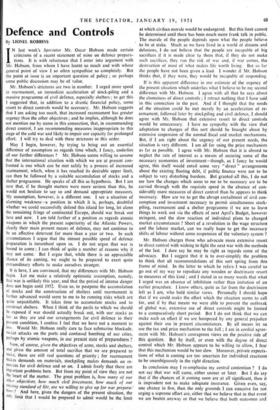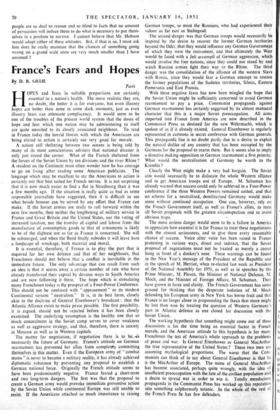Defence and Controls
By LIONEL ROBBINS
IN last week's Spectator Mr. Oscar Hobson made certain criticisms bf a recent statement of mine on defence prepara- tions. It is with reluctance that I enter into argument with Mr. Hobson, from whom I have learnt so much and with whose general point of view I so often sympathise so completely. But the point at issue is an important question of policy ; so perhaps some public discussion may be of value.
Mr. Hobson's strictures are two in number. I urged more speed in rearmament, an immediate acceleration of stock-piling and a massive programme of civil defence, especially shelters ; to get this I suggested that, in addition to a drastic financial policy, some resort to direct controls would be necessary. Mr. Hobson suggests that I am asking too much, that increased rearmament has greater urgency than the other objectives ; and he implies, although he does not mention me by name in this connection, that, in recommending direct control, I am recommending measures inappropriate to this stage of the cold war and likely to impair our capacity for prolonged effort. I will try to deal with these strictures in this order.
May I begin, however, by trying to bring out an essential difference of assumption as regards time which, I fancy, underlies all our further differences ? Mr. Hobson seems willing to assume that the international situation with which we are at present con- fronted is one which can be met safely by a process of increased rearmament, which, when it has reached its desirable upper limit, can then be followed by a suitable accumulation of stocks and a shelter programme. He speaks of all this as hypothesis. But I am sure that, if he thought matters were more serious than this, he would not hesitate to say so and demand appropriate measures. My assumption, however, is a different one. I see a situation of alarming weakness—a position in which it is, perhaps, doubtful whether we could successfully defend this island for long, let alone the remaining fringe of continental Europe, should war break out here and now. I am told further of a position as regards atomic weapons in which the present superiority of the Atlantic Powers, dearly their main present means of defence, may not continue to be an effective deterrent for more than a year or two. In such circumstances I argue that the utmost possible speed of defence preparation is incumbent upon us. I do not argue that war is bound to come ; I can think of quite a number of reasons why it may not come. But I argue that, while there is an appreciable chance of its coming, we ought to be prepared to exert quite extraordinary efforts to make ourselves stronger.
It is here, I am convinced, that my differences with Mr. Hobson begin. Let me make a relatively optimistic assumption, namely, that war is unlikely this year, and that the period of intense danger does not begin until 1952. Even so, to postpone the accumulation of stocks and the construction of shelters until rearmament is further advanced would seem to me to be running risks which are quite unjustifiable. It takes time to accumulate stocks and to construct shelters. When I think of the perils to which we should be exposed if war should actually break out, with our stocks as low as they are and our arrangements for civil defence in their present condition, I confess I feel that we have not a moment to lose. Would Mr. Hobson really care to face submarine blockade, rocket attacks on the ports and continual bombing of our cities, Perhaps by atomic weapons, in our present state of preparedness ?
Now, of course, given the objectives of arms, stocks and shelters, and given the amount of total sacrifice that we are prepared to make, there are still real questions of priority ; for rearmament makes demands on materials, stockpiling makes demands on re- sources for civil defence and so on. I admit freely that there are Important problems here. But from my point of view they are not the heart of the matter. The great problem is, how many of our other objectives, how much civil investment, how much of our "1"Ing standard of life, are we willing to give up for war prepara-' tionv? And here, given the dangers of the present situation, the 0114 limit that I would be prepared to admit would be the limit
at which civilian morale would be endangered. But this limit cannot be determined until there has been much more frank talk in public. The morale of the people depends upon what the people believe to be at stake. Much as we have lived in a world of dreams and delusions, I do not believe that the people are incapable of big sacrifices if it is made clear to them that, if they do not make such sacrifices, they run the risk of war and, if war comes, the destruction of most of what makes life worth living. But so far the people have not been given a lead. 1 wonder if Mr. Hobson thinks that, if they were, they would be incapable of responding.
It is this apparent difference in our estimate of the urgency of the present situation which underlies what I believe to be my second difference with Mr. Hobson. I agree with all that he says about the clumsiness of direct controls ; I retract nothing that I have said in this connection in the past. And if I thought that the needs of the situation could be met merely by an acceleration of re- armament, followed later by stockpiling and civil defence, I should agree with Mr. Hobson that extensive resort to direct controls would be unnecessary. I have no sympathy with the view that adaptation to changes of this sort should be brought about by extensive suspension of the normal fiscal and market mechanisms. But, if I am right about the urgency of our present needs, the situation is very different. I am all for using the price mechanism as far as possible. I agree with Mr. Hobson that it is absurd to neglect the rate of interest as a means of securing some of the necessary economies of investment—though, as I fancy he would agree, this itself would entail some very " direct " arrangements about the existing floating debt, if public finance were not to be subject to very disturbing burdens. But granted'all this, 1 do not see how the changes which seem to me to be necessary are to be carried through with the requisite speed in the absence of con- siderably more measures of direct control than he appears to think necessary. How are we to get the abrupt curtailment of civil con- sumption and investment necessary to permit simultaneous stock- piling, rearmament and a shelter programme if we are to leave things to work out via the effects of next April's Budget, however stringent, and the slow reaction of individual plans to changed market circumstances ? Short of a revolution in the wage structure and the labour market, can we really hope to get the necessary shifts of labour without some suspension of the voluntary system ?
Mr. Hobson charges those who advocate more extensive resort to direct control with wishing to fight the next war with the methods of the last. 1 dare say he may be right as regards some of the advocacy. But I suggest that it is to over-simplify the problem to think that all recommendations of this sort spring from this frame of mind. In the letter to which he refers I was careful to go out of my way to repudiate any wooden or doctrinaire resort to measures of this kind ; and I stated in so many words that what I urged was an absence of inhibition rather than imitation of an earlier procedure. I know others, quite as far from the doctrinaire left as I am, who hold similar views. Personally I should hope that if we could make the effort which the situation seems to call for, and if by that means we were able to prevent the outbreak of global war, extensive use of direct controls might be limited to a comparatively short period. But I do not think that we can make such an effort if we are hampered by any general prejudice against their use in present circumstances. By all means let us use the tax and price mechanism to the full ; I am in cordial agree- ment with Mr. Hobson's courageous views on the positive side of this question. But by itself, or even with the degree of direct control which Mr. Hobson appears to be willing to allow, I fear that this mechanism would be too slow. Moreover, private expecta- tions of what is coming are too uncertain for individual reactions to be unambiguously in the right direction.
In conclusion may I re-emphasise my central contention ? I do not say that war will come, either sooner or later. But I do say that if the chances of it coming soon are at all significant, then it is imprudent not to make adequate insurance. Given even, say, one chance in five, then the only grounds I can conceive for not urging a supreme effort are, either that we believe that in that event we are beaten anyway or that we believe that both statesmen and people are so deaf to reason and so blind to facts that no amount of persuasion will induce them to do what is necessary to put them- selves in a position to survive. I cannot believe that Mr. Hobson would adopt either of these attitudes. But, if that is so, I must ask him does he really maintain that the chances of something going wrong on a grand scale soon are very much smaller than 1 have assumed ?



































 Previous page
Previous page